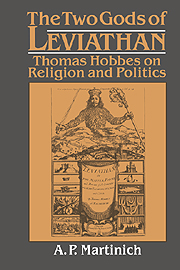Book contents
- Frontmatter
- Contents
- Acknowledgments
- A note on references
- Dedication
- INTRODUCTION
- PART I THE RELIGIOUS BACKGROUND TO HOBBES'S PHILOSOPHY
- PART II LAW, MORALITY, AND GOD
- Chapter 3 POWER, OBLIGATION, AND JUSTICE
- Chapter 4 LAW
- Chapter 5 THE HISTORY AND IDEA OF COVENANTS
- Chapter 6 SOVEREIGN-MAKING COVENANTS
- PART III RELIGION WITHIN THE LIMITS OF SCIENCE AND POLITICS
- Conclusion
- Appendix A Curley on Hobbes
- Appendix B Skinner on Hobbes
- Appendix C The frontispiece to Leviathan
- Notes
- Bibliography
- Index
Chapter 3 - POWER, OBLIGATION, AND JUSTICE
Published online by Cambridge University Press: 30 December 2009
- Frontmatter
- Contents
- Acknowledgments
- A note on references
- Dedication
- INTRODUCTION
- PART I THE RELIGIOUS BACKGROUND TO HOBBES'S PHILOSOPHY
- PART II LAW, MORALITY, AND GOD
- Chapter 3 POWER, OBLIGATION, AND JUSTICE
- Chapter 4 LAW
- Chapter 5 THE HISTORY AND IDEA OF COVENANTS
- Chapter 6 SOVEREIGN-MAKING COVENANTS
- PART III RELIGION WITHIN THE LIMITS OF SCIENCE AND POLITICS
- Conclusion
- Appendix A Curley on Hobbes
- Appendix B Skinner on Hobbes
- Appendix C The frontispiece to Leviathan
- Notes
- Bibliography
- Index
Summary
TWO INTERPRETATIONS
There are two opposing interpretations of Hobbes's moral theory, one supported by the secularists and one supported by the religionists. According to the secularists, Hobbes's moral theory is based upon self-interest. Moral laws are egoistic or prudential prescriptions. According to this view, Hobbes holds the following:
An action a is moral if and only if a is derivable by reason alone as conducive to self-preservation.
This is the received view of Hobbes's moral theory. The problem for this interpretation is to explain why Hobbes's theory should count as a moral theory if Hobbes's laws of nature merely codify maxims of self-interest. Some secularists simply deny that Hobbes has a moral theory. Others have ingenious explanations for why his theory should count as a moral theory. According to the religionists, Hobbes holds a divine command theory of morality. The principal proponents of this view are A. E. Taylor, Howard Warrender, and F. C. Hood. According to their rendition of it, a divine command theory holds the following:
An action a is moral in virtue of a law of nature if and only if God commands that a be done.
The phrase “in virtue of a law of nature” is necessary, in order to separate the issue of what makes something moral for any human being from the issue of whether God may have imposed some moral obligations on certain human beings.
- Type
- Chapter
- Information
- The Two Gods of LeviathanThomas Hobbes on Religion and Politics, pp. 71 - 99Publisher: Cambridge University PressPrint publication year: 1992



